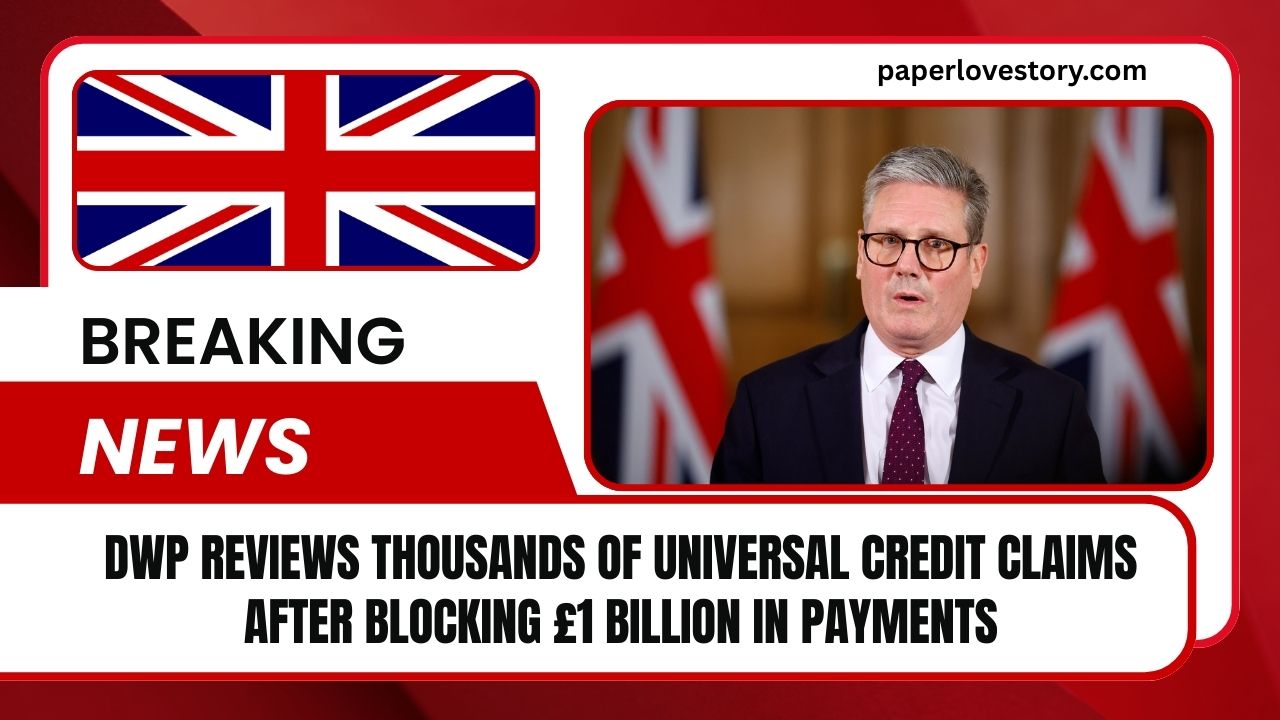The Department for Work and Pensions (DWP) in the UK has taken a strong step to protect taxpayers’ money and prevent people from falling into debt.
Recently, DWP confirmed that it has stopped over £1 billion in incorrect Universal Credit payments by reviewing more than one million claims. This work is part of a government program known as the Targeted Case Review, which was launched to stop mistakes, fraud, and overpayments in the welfare system.
With millions of people in Britain depending on Universal Credit, the government’s actions are important for both families and the economy. This article explains what the Targeted Case Review is, how it works, why so many claims are being checked, and what it means for claimants in the future.
What Is Universal Credit?
Universal Credit is the UK’s main welfare benefit that replaces six older benefits. It is designed to give financial support to people who are on low income, unemployed, or unable to work due to health issues.
Currently, about 7.5 million people in Britain rely on this benefit. In 2024, Universal Credit cost the UK government £67 billion, which shows how big and important this system is for families across the country.
Why DWP Launched the Targeted Case Review
The Targeted Case Review was introduced in 2022 with one main aim: to stop incorrect payments. Mistakes in benefit payments can cause problems in two ways:
- Overpayments – Claimants may receive more money than they should, leading to debt when DWP later asks for the money back.
- Underpayments – Some people may get less than what they deserve, leaving them struggling to pay bills.
By reviewing cases, DWP can make sure people get the right amount of money and that the welfare system is fair.
How Many Claims Have Been Reviewed?
Since July 2024, DWP has increased the number of staff working on the Targeted Case Review from a few thousand to almost 6,000 people. This larger team has already checked over one million Universal Credit claims.
As a result, the department has successfully blocked £1 billion in incorrect payments, which could have caused financial stress for thousands of families.
Government’s Future Goals
The UK Government is not stopping here. By 2030, the DWP expects to save £13.6 billion through this review process. This will help reduce fraud, mistakes, and waste in the welfare system.
According to Andrew Western, the Minister for Transformation, the program is not just about saving money—it also ensures that people who were previously underpaid finally receive what they are entitled to.
How the Review Process Works
The Targeted Case Review checks each Universal Credit claim carefully. Claimants may be asked to provide:
- Proof of identity
- Updated documents to confirm their income, living arrangements, or family situation
- Additional information if there are doubts about eligibility
If fraud or major errors are found, the case is reported for further investigation.
Why This Matters for Claimants
For families relying on Universal Credit, this program brings both benefits and challenges.
- Positive side: It ensures people who deserve payments are not left out, and the system becomes more reliable.
- Negative side: Some claimants may face delays if their documents are under review or if mistakes are found.
Here’s a summary of key numbers linked to this initiative:
| Key Point | Details |
|---|---|
| Universal Credit claimants | 7.5 million people |
| Cost of Universal Credit in 2024 | £67 billion |
| Number of claims reviewed | Over 1 million |
| Incorrect payments stopped | £1 billion |
| Number of staff working on reviews | Nearly 6,000 |
| Future savings by 2030 | £13.6 billion |
Government’s Strong Message
The UK Government has made it clear:
- Fraud, waste, and errors will not be tolerated.
- Taxpayers’ money must be protected.
- Public services deserve more investment, and stopping wrong payments is one way to ensure funds are used properly.
The DWP’s £1 billion success in blocking incorrect Universal Credit payments shows how important accurate claim reviews are for both claimants and the government.
With millions of people relying on these benefits, the Targeted Case Review plays a key role in making the welfare system more fair, transparent, and effective.
By 2030, projected savings of £13.6 billion mean more funds can be used for public services like healthcare, education, and infrastructure. For families, this means less risk of debt and a stronger guarantee that they receive the right financial support at the right time.
FAQs
What is the DWP Targeted Case Review?
The Targeted Case Review is a program started in 2022 to check Universal Credit claims, fix errors, prevent fraud, and ensure correct payments.
How much money has been saved so far?
So far, DWP has stopped £1 billion in incorrect payments by checking over one million claims since last summer.
Will claimants lose their benefits during the review?
No. Claimants will not lose benefits if they are eligible. However, they may be asked for extra documents, and payments could be delayed until checks are complete.
